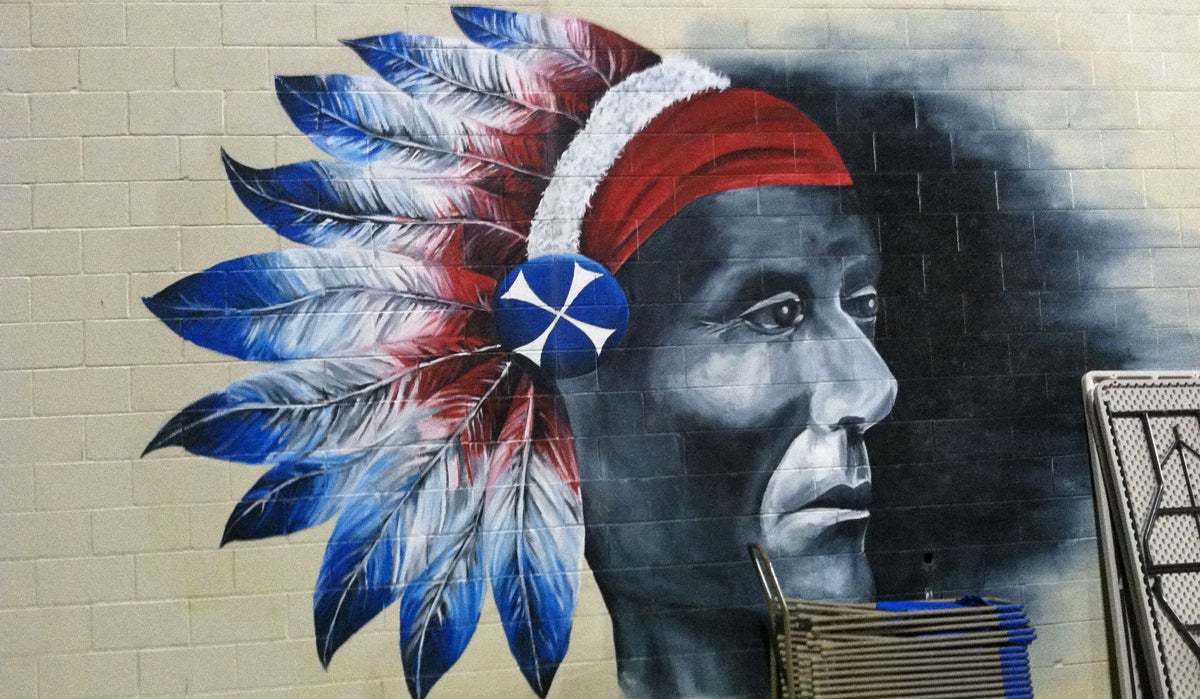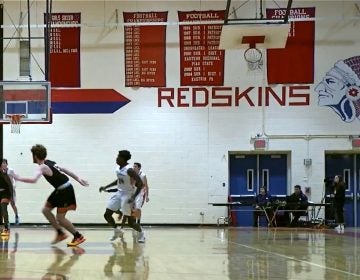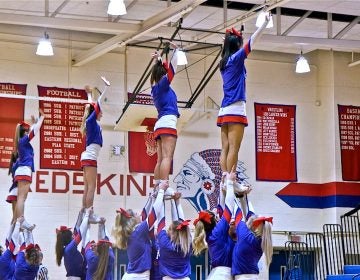Neshaminy to appeal state ruling on controversial nickname
The district argues the Pa. Human Relations Commission doesn’t have the authority to dictate how it educates its students or spends its money.

A mural of the Neshaminy High School mascot. (Eugene Sonn/WHYY)
The Neshaminy School District in Bucks County is appealing a state decision that requires it to get rid of any logos and imagery that “negatively stereotype Native Americans.”
For more than a half-century, the suburban district has called some of its sports teams the “Redskins,” a term many consider a racial slur.
The high school’s basketball team pairs the name with a logo depicting a Native American warrior. The baseball team has a tomahawk on its caps. The football team’s helmets are adorned with the word “Skins.”
In a statement, the district said it was “compelled” to appeal because the decision is rooted in “unsubstantiated claims of racism,” and because it would force it to spend taxpayer dollars — potentially up to $1 million — to alter facilities and programs.
The ruling, announced by the Pennsylvania Human Relations Commission last week, allows the district to keep using the word “Redskins” as long as it educates its students about stereotyping.
The district is also appealing that part of the decision, saying in the same statement that the requirement interferes “with the authority of the duly elected School Board,” as well as the “District’s effort to teach students to think independently as opposed to indoctrinating them with certain points of view.”
“I’m not surprised,” said Chad Dion Lassiter, executive director of the PHRC, of the appeal. “Often times, people want to hold on to what they think is right, even when it’s wrong. And people want to maintain status quo when it benefits them from a privileged perspective.”
The district’s appeal is rooted in a 2015 lawsuit filed by commission staff. The complaint argues that the word “Redskins” is a derogatory name for Native Americans and that it creates a “hostile educational environment” for district students.
In its ruling last week, the commissioners said there was not enough evidence to legally prove the allegation because no Native American students testified that they were harassed because of the word.
More than 80% of Bucks County residents are white, according to the U.S. Census Bureau. Less than 1% are American Indian.
In an apparent contradiction, the commissioners conceded that the term should not be used as a team name for any school in the state, “regardless of the origin of the name or the pride that some may see in maintaining the use of that term.”
The decision distinguishes between the word “Redskins” and the logos and images of Native American culture that accompany it, setting up what some viewed as a partial victory for the district.
“Redskins alone has been shown to evoke feelings of loyalty in many, and does create a sense of unity with which fans of sports teams identify. It is stereotypical logos and images that pose a problem,” reads a section of the commission’s ruling.
In 2013, former Neshaminy parent Donna Fann-Boyle filed a complaint with the commission, hoping it would push the district to stop using the word “Redskins.”
Fann-Boyle, who has Native American ancestry, withdrew her complaint in the face of community backlash, but not before the commission found that it was valid.
“I’m disappointed,” said Fann-Boyle of the district’s decision to appeal. “I was hoping that they would take this opportunity to actually deal with the issue.”
In 2013, a group of student newspaper editors at The Playwickian announced the high school newspaper would no longer publish the word “Redskins” in its pages because they deemed the word racially insensitive to Native Americans.
The decision sparked a battle with school officials that made national headlines.
In response to the student-led ban, Neshaminy’s school board passed a policy that barred editors from removing “Redskins” from op-eds, but allowed them to keep it out of news articles.
WHYY is your source for fact-based, in-depth journalism and information. As a nonprofit organization, we rely on financial support from readers like you. Please give today.




